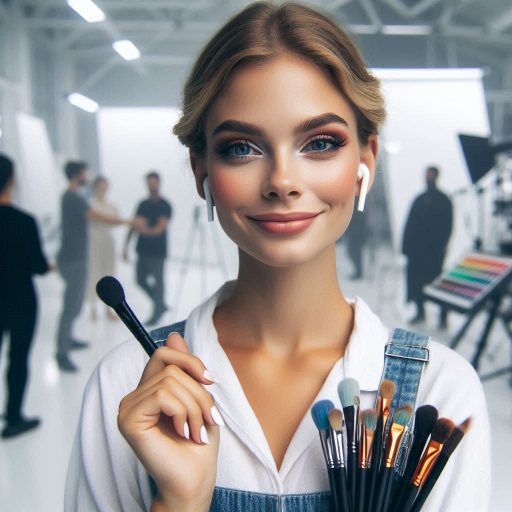Introduction
A SFX (Special Effects) artist is responsible for creating realistic illusions in movies, television shows, and theater productions.
They use makeup, prosthetics, and other materials to transform actors and create visual effects.
Honing the right skills is crucial for a successful career in SFX makeup.
These skills not only showcase creativity but also ensure accuracy and attention to detail, which are essential in this highly competitive industry.
Creativity
Ability to think outside the box and come up with unique and innovative ideas for special effects makeup
Creativity is a crucial skill for any successful SFX artist.
It is the ability to think outside the box and come up with unique and innovative ideas for special effects makeup that sets you apart from the competition.
As an SFX artist, you are often tasked with creating otherworldly creatures, fantastical beings, and terrifying monsters.
Your creativity will be what brings these characters to life on the screen or stage.
Using creativity to bring characters and scenes to life
By thinking creatively, you can develop new techniques, experiment with different materials, and push the boundaries of what is possible in special effects makeup.
Your imagination is the limit when it comes to creating stunning and believable effects that captivate audiences.
When you harness your creativity, you can transform ordinary actors into extraordinary beings.
Your ability to bring characters and scenes to life through your unique vision will make you a sought-after artist in the world of special effects makeup.
Read: Makeup Artist Must-Read Books and Resources
Attention to detail
When it comes to being a successful SFX artist, one of the most crucial skills is attention to detail.
Importance of precision and attention to detail
- Precision is key in creating realistic special effects that truly wow audiences.
- Attention to detail ensures that every aspect of the makeup design is flawless and cohesive.
- Small details can make a huge difference in the overall impact of a special effects makeup look.
- Without precision and attention to detail, special effects can end up looking sloppy or unconvincing.
Skills in fine-tuning and perfecting makeup designs for camera close-ups
Close-up shots can be unforgiving, highlighting any imperfections or mistakes in the makeup.
SFX artists must have the skills to fine-tune and perfect their designs for these close-up shots.
This involves paying close attention to every detail, from texture to color to placement.
Being able to create makeup looks that stand up to scrutiny under the camera lens is essential for success.
Overall, attention to detail is a skill that can truly set a SFX artist apart and elevate their work to the next level.
Transform Your Career Today
Unlock a personalized career strategy that drives real results. Get tailored advice and a roadmap designed just for you.
Start NowKnowledge of materials
When it comes to being a successful SFX artist, having a strong knowledge of materials is crucial. Here are some key points to consider:
Understanding different materials used in SFX makeup
- Prosthetics: Knowing how to work with prosthetics is essential for creating realistic effects.
- Latex: Understanding the properties of latex and how it behaves on the skin is important for creating textures and wounds.
- Silicone: Silicone is another common material used in SFX makeup for its flexibility and realistic appearance.
Ability to choose the right materials for each project
- Consider the desired outcome: Different materials have different properties that can help achieve specific effects.
- Think about the skin: Some materials may be more suitable for certain skin types or sensitivities.
- Durability: Selecting materials that are long-lasting and can withstand different conditions is key for a successful project.
- Budget: Being able to work within a budget and choose cost-effective materials without compromising quality is a valuable skill.
Having a solid understanding of various materials used in SFX makeup and the ability to choose the right ones for each project will set you apart as a skilled and successful SFX artist.
Remember, practice makes perfect, so don’t be afraid to experiment with different materials to expand your skills and creativity.
Read: Sustainable Practices in Makeup Artistry
Makeup application techniques
When it comes to being a successful SFX artist, mastering makeup application techniques is crucial.
These skills allow artists to bring their creative visions to life through the application of prosthetics, colors, and textures.
Proficiency in a variety of makeup application techniques for creating special effects
Having proficiency in a variety of makeup techniques is essential for creating convincing special effects.
This includes mastering airbrushing, which allows for a seamless application of color and texture on the skin.
It is also important to be skilled in texturing, which involves creating realistic textures like scars, wounds, or wrinkles on the skin.
Lastly, sculpting is a key technique for SFX artists, as it involves manipulating materials to create three-dimensional effects on the face and body.
Continuous learning and practicing to improve skills in makeup application
Continuous learning and practice are paramount for improving skills in makeup application.
SFX artists should always be seeking out opportunities to learn new techniques, whether through workshops, tutorials, or experimentation.
Practicing regularly helps to refine skills and build confidence in executing various makeup effects.
Overall, mastering makeup application techniques is a foundational skill that every successful SFX artist must possess.
By honing these skills, artists can create stunning and realistic special effects that captivate audiences and elevate their careers in the industry.
Read: How to Build a Career in Multimedia Design

Communication skills
When it comes to a successful career as a special effects (SFX) artist, having top-notch communication skills is essential.
Collaboration with Team Members
One key aspect of communication skills for an SFX artist is the ability to collaborate effectively with directors, producers, and other members of the production team.
This involves understanding their vision for the project and working together to bring it to life.
Showcase Your Business Today
Reach thousands of readers actively exploring professional services. Publish your business profile and grow your audience now.
Publish NowEffective Idea Communication
Being able to effectively communicate your ideas as an SFX artist is crucial.
Whether it’s pitching a concept or discussing potential changes to a project, clear and concise communication is key.
Adaptability and Adjustments
Communication skills also come into play when it comes to making adjustments to meet the needs of a project.
As an SFX artist, you must be able to take feedback and direction and implement changes accordingly.
Client Relationships
In addition to working with the production team, SFX artists often interact with clients.
Strong communication skills are essential for building and maintaining positive relationships with clients, understanding their needs, and delivering results that exceed their expectations.
Overall, communication skills are a fundamental component of a successful career as an SFX artist.
By honing your ability to collaborate, convey ideas effectively, make adjustments, and build relationships, you can set yourself up for success in this competitive and dynamic field.
Read: Portfolio Tips for Aspiring Multimedia Artists
Adaptability
Being able to work in different environments
One of the essential skills needed for a successful SFX artist career is adaptability.
SFX artists often work on various projects, ranging from films to theater productions, and each setting requires a different approach and skill set.
Working on a film set, for example, may require the SFX artist to be able to collaborate with a large team of professionals, including directors, producers, and actors.
The artist must be adaptable and able to adjust to the fast-paced and high-pressure environment of a film set.
Flexibility to adapt to different styles and preferences of clients and directors
Similarly, working in a theater setting may require a different set of skills and abilities.
The SFX artist must be able to work with limited resources and space, and may need to come up with creative solutions to achieve the desired effects on stage.
Additionally, when working on photo shoots, the SFX artist must be able to adapt to the preferences and styles of different clients and photographers.
Each client may have a different vision for the final look, and the artist must be flexible enough to accommodate these preferences while still showcasing their own unique skills and techniques.
In general, adaptability is a crucial skill for SFX artists to have in order to succeed in their careers.
By being able to work in different environments and adapt to the preferences of clients and directors, SFX artists can ensure that they are versatile and capable of taking on a wide range of projects.
Time management
Time management is a crucial skill for SFX artists to master in order to have a successful career in the industry.
With the fast-paced nature of film and television production, artists must be able to juggle multiple projects and deadlines simultaneously.
Handling multiple projects and deadlines efficiently
Handling multiple projects and deadlines efficiently is essential for SFX artists.
They often work on various productions at the same time and need to prioritize tasks based on urgency and importance.
By managing their time effectively, artists can ensure that they meet all project deadlines without compromising on the quality of their work.
Organizing workflow to ensure timely completion of makeup designs and applications
Organizing workflow is another key aspect of time management for SFX artists.
They must plan out their makeup designs and applications in advance to ensure that they can complete each project on time.
By breaking down the workflow into manageable steps and setting deadlines for each task, artists can stay on track and avoid last-minute rushes.
Furthermore, time management skills help SFX artists maintain a good reputation in the industry.
By consistently delivering high-quality work on time, artists can build strong relationships with producers, directors, and other industry professionals.
This can lead to repeat business and opportunities for career advancement in the future.
In review, time management is a critical skill for SFX artists to cultivate.
By handling multiple projects and deadlines efficiently and organizing their workflow effectively, artists can ensure the timely completion of their makeup designs and applications, ultimately leading to a successful career in the industry.
Continuous learning and improvement
Staying updated on the latest trends and techniques in SFX makeup
One of the most important skills for a successful SFX artist is the ability to continuously learn and improve.
In the ever-evolving world of special effects makeup, staying up-to-date on the latest trends and techniques is essential to staying competitive in the industry.
Attending workshops, classes, and seminars to enhance skills and stay competitive in the industry
Attending workshops, classes, and seminars is a great way to enhance your skills and learn from industry professionals.
These opportunities allow you to gain new knowledge, improve your technique, and stay ahead of the curve.
By investing in your education and professional development, you can expand your skill set and take your career to the next level.
Continuous learning is not only beneficial for honing your craft, but it also demonstrates your commitment to growth and improvement.
Employers and clients appreciate artists who are dedicated to mastering their skills and staying current with industry standards.
In addition, networking with other professionals in the field can provide valuable insights and opportunities for collaboration.
Showcase Your Business Today
Reach thousands of readers actively exploring professional services. Publish your business profile and grow your audience now.
Publish NowBy surrounding yourself with like-minded individuals who share your passion for SFX makeup, you can gain inspiration, support, and valuable connections that can help propel your career forward.
Overall, a commitment to continuous learning and improvement is essential for success as an SFX artist.
By staying informed, attending workshops, and connecting with other professionals, you can enhance your skills, expand your opportunities, and achieve your career goals in the world of special effects makeup.
Conclusion
A successful career as a special effects (SFX) artist demands a unique blend of creativity, technical skills, and attention to detail.
Creativity is essential, as SFX artists must visualize and bring imaginary worlds to life.
Whether working on a blockbuster film or a television series, they use their imagination to create captivating visual effects that enhance storytelling.
Technical skills, such as proficiency with software like Maya, Adobe After Effects, or Blender, are crucial.
These programs help SFX artists manipulate digital assets to achieve realistic effects.
Understanding 3D modeling, animation, and compositing are key technical areas to master.
A strong foundation in traditional art, such as drawing and sculpting, enhances an SFX artist’s ability to understand form, texture, and lighting.
Practical skills like mold-making and prosthetics can also set an SFX artist apart in a competitive field.
Problem-solving abilities are critical for navigating the challenges of complex projects.
SFX artists often face tight deadlines and technical limitations, requiring innovative solutions.
Lastly, teamwork and communication skills ensure that an SFX artist collaborates effectively with directors, producers, and other creative professionals.
Being able to translate creative visions into practical effects is a vital part of the job.
Developing these skills will help aspiring SFX artists excel in a competitive and fast-paced industry, opening doors to diverse opportunities in film, television, and beyond.
[E-Books for Sale]
The Big Book of 500 High-Paying Jobs in America: Unlock Your Earning Potential
$19.99 • 500 High-Paying Jobs • 330 pages
Explore 500 high-paying jobs in America and learn how to boost your career, earn more, and achieve success!
See All 500 High-Paying Jobs of this E-Book
1001 Professions Without a Degree: High-Paying American Jobs You Can Start Now
$19.99 • 1001 Professions Without a Degree • 174 pages
Discover 1001 high-paying jobs without a degree! Unlock career tips, skills, and success strategies for just $19.99!




